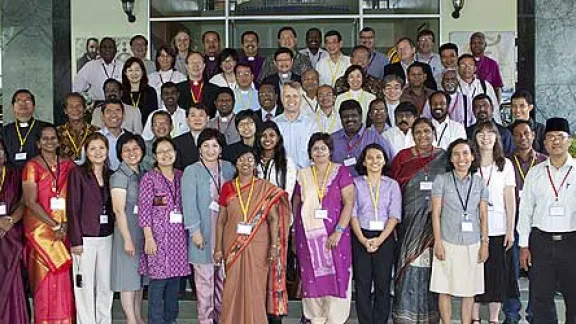
Participants at the Asian Church Leadership Conference in Bangkok, Thailand, 12-16 April © Bernard Riff
Asia Church Leadership Conference
Lutheran churches in Asia have embarked on a reformation of their theological understanding and reflection on holistic mission and Lutheran identity in the context of the region’s rapid secularization.
Sixty-five leaders from Asia’s Lutheran churches and mission partners met in Bangkok, Thailand, 12-16 April, for the Asian Church Leadership Conference (ACLC), organized by The Lutheran World Federation (LWF) Department for Mission and Development (DMD) under the theme “Strengthening the Asian Communion in Changing Times.” The ACLC is convened every two years with the aim to discuss strategies and programs of the regional Lutheran communion, which includes 52 LWF member churches.
The region’s interfaith context continues to challenge the churches and they must not be ignored, the church leaders said, noting that discipleship remains an important part of the life of the church but must be clearly defined in the Asian context.
Bishop Nelson Lakra of the Gossner Evangelical Lutheran Church in Chotanagpur and Assam, in India, remarked that the Asian Lutheran communion now has a clear direction for its theological formation as well as its reflection on holistic mission and Asian Lutheran identity that will strengthen it amid changing times.
“There is strong leadership provided by the LWF Asia desk and the Asian leadership has shown strong unity and cooperation for this common course. The Asian communion remains committed to its churches and the Gospel of our Lord Jesus Christ in season and out of season,” Lakra said.
Rev. Dr Kenneth Mtata, study secretary for Lutheran Theology and Practice at the LWF Department for Theology and Public Witness, said that rapid social changes are affecting the church’s self-understanding and capability as well as its perceived legitimacy in society, and it must adapt its theological communication.
“Only a comprehensive theological response can reposition the church to speak with relevance and authority in these changing times,” Mtata said.
The Same Gospel in Different Contexts
In his opening address, LWF General Secretary Rev. Martin Junge highlighted the apostolic tradition of churches extending the arm of fellowship to one another.
“The main reason for the apostles to reach out and connect with each other was to share in the spreading of the gospel. Very early, churches understood the need to relate to each other as a way to avoid self-centeredness and uncritical alignment to prevailing cultures,” Junge said. “As they visited each other, churches began to realize how the same gospel would be received and witnessed differently in different contexts.”
Referring to Acts 15, Junge shared how the early church saw it as its responsibility to address such differences of culturally framed reception by emphasizing the basics of the gospel and an attitude of hospitality to one another. “Your meeting as the Asian communion of churches is an expression of that apostolic wisdom that there is no church which is too small to give, and no church is too big to receive,” he concluded.
A Discipleship of Equals
LWF Vice-President for Asia Ms Eun-Hae Kwon conveyed to the ACLC participants greetings from LWF President Bishop Dr Munib A. Younan. In his message, the LWF president emphasized “a discipleship of equals” which is grounded on equality before God and the equal calling by God to serve the world. “Because we are called, we are free to engage with others and share the good news in communion as Lutherans,” he said.
Younan said “discipleship is a concept that we need to reclaim as we seek to accompany one another, as we participate in God’s redeeming and reconciling mission in a broken and globalized world.”
Emphasis on Networking and Commitment
Participants from Myanmar underscored the importance for churches in the region to display a strong commitment to each other. They noted that the renewal of the Asian Lutheran communion through theological reflection offers hope for the church in the context of secularization.
The signing of a Memorandum of Understanding by the Lutheran Church of Myanmar, Myanmar Lutheran Church and The Mara Evangelical Church, as well as the formation of a network of west Asia churches, will help strengthen the Asian Lutheran communion, said Satu Ve-U, general secretary of the Mara church.
“The emphasis on networking affirms our love and commitment to each other for mutual accompaniment towards growth and in facing the challenges of secularization in changing times,” he said.
Kisku Logen from the Bangladesh Northern Evangelical Lutheran Church noted that the renewal process, with its focus on theological formation and reflection and emphasis on holistic mission and Asian Lutheran identity “provides a clear strategy and hope for the Asian communion against secularization.”


